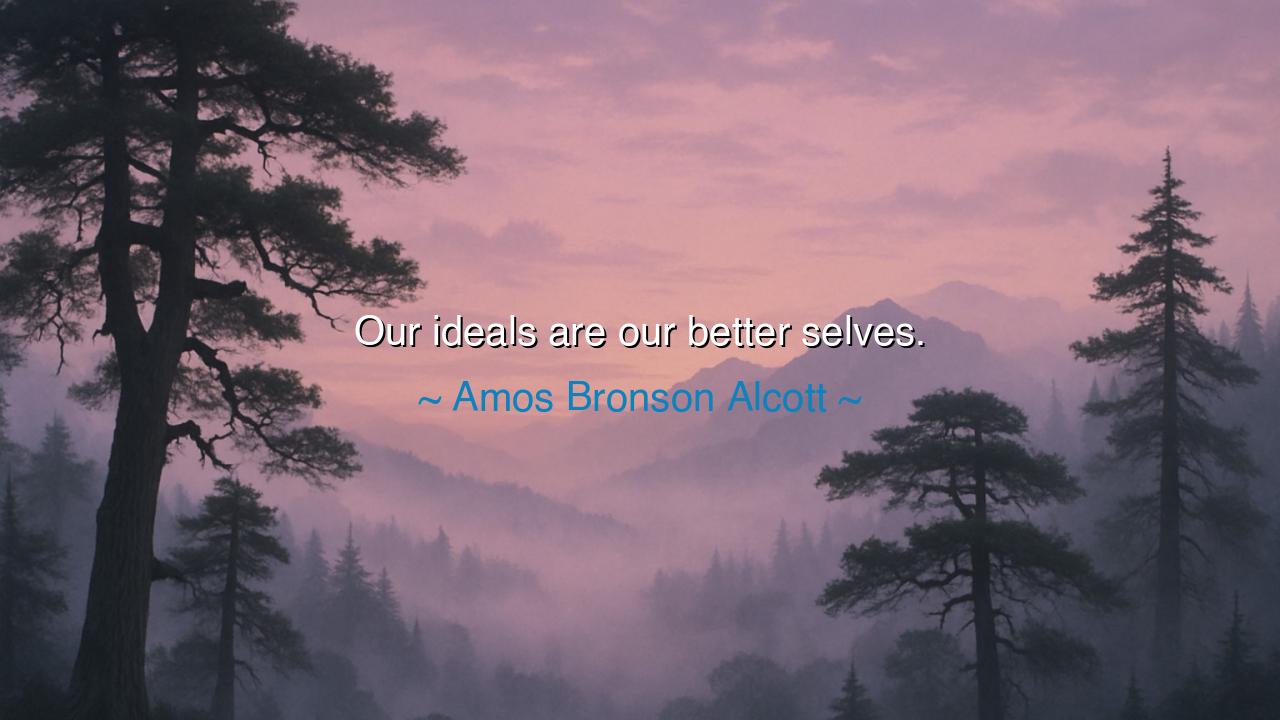
Our ideals are our better selves.






In the luminous words of Amos Bronson Alcott, the philosopher, reformer, and father of the great writer Louisa May Alcott, we find a truth that gleams like a star in the long night of the soul: “Our ideals are our better selves.” These few words, simple as they appear, contain the essence of human aspiration — the eternal struggle between what we are and what we are meant to become. For within every person dwells two beings: the self that lives, and the self that aspires. The first is bound by circumstance and imperfection; the second is lifted by vision, by principle, by the quiet fire of idealism that calls us toward the good, the just, and the beautiful.
The origin of this quote lies in Alcott’s devotion to Transcendentalism, that great movement of the 19th century that sought to awaken the divine within humanity. Alongside his contemporaries — Emerson, Thoreau, and others — Alcott believed that man was not merely a creature of flesh, but a vessel of spirit; that to pursue one’s ideals was to commune with the divine order of the universe itself. In this light, to have an ideal is not to chase illusion, but to reach for truth. For ideals are not fantasies — they are reflections of our higher nature, glimpses of what we are when fear, greed, and weakness fall away. They are the blueprint of the soul’s perfection, the whisper of eternity within the passing hour.
To say “our ideals are our better selves” is to recognize that the noblest parts of who we are live first in the realm of imagination and conscience. Every act of courage was once only a dream of bravery. Every reform, every discovery, every work of art began as an ideal held within the heart of one who refused to let reality extinguish vision. Consider Mahatma Gandhi, whose ideal of nonviolence seemed impossible before it was lived. He was not guided by mere strategy or law but by a vision of the better self of humanity, one in which truth and compassion triumphed over hatred and power. His ideals, born of spirit, transformed the material world. Thus we see that to pursue our ideals is not to escape reality, but to redeem it.
Alcott’s teaching reminds us that ideals are not luxuries of thought, but necessities of being. They are the moral compass by which we steer through life’s storms. Without them, man drifts — rich in possessions, poor in purpose. It is the ideal of justice that restrains the hand of tyranny; the ideal of love that softens the heart of cruelty; the ideal of truth that guards us against the decay of lies. When societies lose sight of their ideals, they grow sick and cynical. But when they remember them — when they strive again for equality, for wisdom, for beauty — they are reborn. Just as an individual is ennobled by his conscience, so a nation is elevated by its ideals.
And yet, Alcott’s words also carry a warning. To have ideals is to hold a mirror before oneself — to see not only the light but the shadow. For ideals remind us how far we have fallen short. This tension, though painful, is sacred, for it keeps the heart alive. It is the difference between complacency and growth. The painter who seeks perfection in his art may never attain it, but in the pursuit, his soul becomes refined. Likewise, when we strive toward our ideals — however unattainable they seem — we become truer, stronger, wiser. The striving itself is the purification of the soul.
History offers countless examples of those who lived not by comfort, but by ideal. The American abolitionists, ridiculed and hated in their time, refused to yield their belief in the moral equality of all men. Their ideal of liberty — their “better self” as a nation — pulled the United States through its darkest trial. And though the road was long and bloody, it was the ideal, not the pragmatism of the moment, that prevailed. So too, in every age, the dreamers, philosophers, and saints — from Plato to Lincoln to Eleanor Roosevelt — have reminded humanity that our better selves live within the ideals we dare to defend.
Let this, then, be the lesson drawn from Alcott’s wisdom: to live without ideals is to live without soul. But to live by them is to partake in the divine work of creation — the making of a life, a society, a world that reflects the highest truth within us. Let your ideals not be faint wishes but guiding stars. Let them shape your actions, your words, your thoughts. Seek not perfection in the world, but faithfulness to your better self in all you do.
And so, dear listener, remember: every day presents a choice — between the self that is and the self that might be. The one drifts with circumstance; the other shapes destiny. Choose the latter. Let your ideals be the voice of your better self, and let that voice lead you onward, ever upward, toward the life your spirit was born to live. For as Amos Bronson Alcott taught, when we walk in the light of our ideals, we do not merely live — we begin to become.






AAdministratorAdministrator
Welcome, honored guests. Please leave a comment, we will respond soon